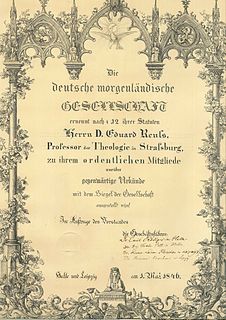 W
WThe American Oriental Society was chartered under the laws of Massachusetts on September 7, 1842. It is one of the oldest learned societies in America, and is the oldest devoted to a particular field of scholarship.
 W
WThe Center of Studies of Ancient Near Eastern History is a university-based research institution of the Pontifical Catholic University of Argentina, Buenos Aires, Argentina, focused on the history and archaeology of the Ancient Near East. The CEHAO has many periodical publications. The center's flagship is Antiguo Oriente, an annual peer-reviewed journal. CEHAO also publishes, jointly with the Society of Biblical Literature, the open-access peer-reviewed Ancient Near East Monographs (ANEM). Finally, Damqatum, an annual journal aimed at the general public with publications of preliminary high-impact research results.
 W
WThe Deutsche Morgenländische Gesellschaft, abbreviated DMG, is a scholarly organization dedicated to Oriental studies, that is, to the study of the languages and cultures of the Near East and the Far East, the broader Orient, Asia, Oceania, and Africa.
 W
WThe Institute of Social Sciences Research is an excellence research center of the Pontifical Catholic University of Argentina and Associated Unit of the CONICET located in Buenos Aires, Argentina, dedicated to research in the field of the social sciences and the humanities.
 W
WThe Melammu Project investigates the continuity, transformation and diffusion of Mesopotamian and Ancient Near Eastern culture from the third millennium BCE through the ancient world until Islamic times. It does so by organizing conferences and by providing resources relevant to the project on its website.
 W
WThe Netherlands Institute for the Near East is an institution for the advancement of the study of the Ancient Near East, Mesopotamia, Anatolia, and Egypt. It is an independent foundation with close ties to Leiden University, housed at the Faculty of Humanities. The institute was founded in 1939. In 2017 the board of NINO decided to integrate the library into Leiden university and to transform the institute to a pure "research school".
 W
WThe Royal Asiatic Society of Great Britain and Ireland, commonly known as the Royal Asiatic Society (RAS), was established, according to its royal charter of 11 August 1824, to further "the investigation of subjects connected with and for the encouragement of science, literature and the arts in relation to Asia." From its incorporation the society has been a forum, through lectures, its journal, and other publications, for scholarship relating to Asian culture and society of the highest level. It is the United Kingdom's senior learned society in the field of Asian studies. Fellows of the society are elected regularly. Fellows include highly accomplished and notable scholars of Asian studies. They use the post-nominal letters FRAS.
 W
WThe Oriental Institute (OI), established in 1919, is the University of Chicago's interdisciplinary research center for ancient Near Eastern ("Orient") studies and archaeology museum. It was founded for the university by professor James Henry Breasted with funds donated by John D. Rockefeller, Jr. It conducts research on ancient civilizations throughout the Near East, including at its facility, Chicago House, in Luxor, Egypt. The Institute publicly exhibits an extensive collection of artifacts related to ancient civilizations at its on-campus building in Hyde Park, Chicago. According to anthropologist William Parkinson, the OI's highly focused "near Eastern, or southwest Asian and Egyptian" collection is one of the finest in the world.